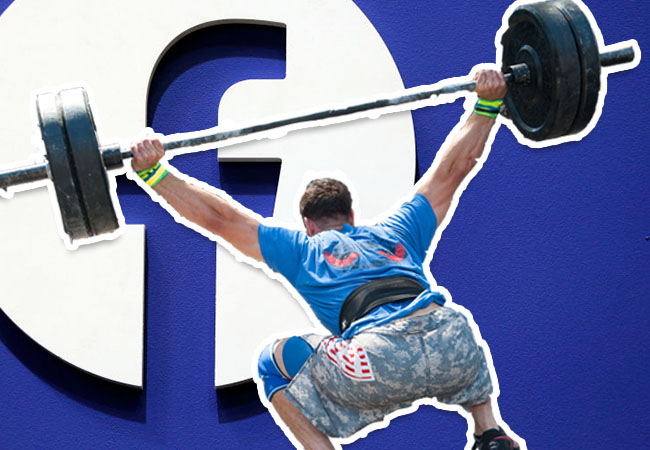
CrossFit, the multimillion dollar company and health phenomenon, removed itself from Facebook and Instagram today, suspending its accounts and publishing a lengthy explanation that cites the social media company’s privacy faults, censorship, security, and relationship with the “global chronic disease crisis”.
The decision came after a particularly large Facebook group dedicated to discussing a low carb, high-fat diet popular among CrossFitters was unceremoniously deleted and later reinstated by Facebook, with zero explanation provided to its users. “CrossFit Inc has placed Facebook and its associated properties under review and will no longer support or use Facebook’s services,” read a statement.
CrossFit’s reaction could be a significant move unprecedented in the social media era, or it could just be a misunderstanding that will quickly resolve itself.
But with its pointed statement, and its history of tackling other major corporations like Coca-Cola, CrossFit’s condemnation of Facebook raises a new question: what happens when quitting Facebook is presented as a legitimate health and lifestyle issue?
In its official explanation of the decision to leave Facebook, CrossFit describes itself as a “contrarian physiological and nutrition prescription for improving fitness and health.” But it’s more likely you know CrossFit because of the brand it has built surrounding the people who do it: CrossFitters are fit, CrossFitters are healthy, and CrossFitters love CrossFit. They talk about paleo and stretching and keto and macros. They talk about each other. They are all part of the “CrossFit cult.”
Perhaps the fitness giant’s greatest achievement has been its ability to combine the community of a local gym with a sense of competition. If you’re drinking the (stevia-enhanced) cordial, CrossFit isn’t a place you work out. CrossFit is a lifestyle. And the people who live that lifestyle post about it online. A lot.
So what happens when that lifestyle brand, backed by millions of people worldwide who open their own gyms, buy CrossFit branded apparel, and compete in Olympics-style events, announces that Facebook is now an enemy?
Greg Glassman, the founder and sole owner of CrossFit, is no stranger to fighting big corporations. In 2018, Glassman’s extensive war with America’s soft drink industry was profiled by the Washington Post. CrossFit has Coca-Cola for over a year now, publishing articles that compare Big Soda to the threat of opioids, and pointing at the money it pours into health nonprofits, medical organizations, and the fitness industry in general. “For me it’s a holy war,” he told The Washington Post. “They are selling poison, and they are corrupting the health sciences.”
The open letter against Facebook published by CrossFit today – one we can assume Glassman at the very least rubber stamped – strikes a similar, anti-corruption tone. It cites complaints over the way Facebook collects and aggregates user information, alleging it shares that information with authorities; it accuses the platform of collaborating with the government for mass surveillance projects; and it hits out at perceived censorship, account removal, and vulnerability to misinformation campaigns. Crucially, it accuses Facebook of being “complicit in the global chronic disease crisis” by deleting accounts and spaces that go against traditional ideas of health.
“Facebook and its properties host and oversee a significant share of the marketplace of public thought,” says the statement.
“To millions of individuals and communities across the world, Facebook and its properties remain the platforms where ideas and information are exchanged. Facebook thus serves as a de facto authority over the public square, arbitrating a worldwide exchange of information as well as overseeing the security of the individuals and communities who entrust their ideas, work, and private data to this platform. This mandates a certain responsibility and assurance of good faith, transparency, and due process.
“CrossFit, Inc. as a voluntary user of and contributor to this marketplace, can and must remove itself from this particular manifestation of the public square when it becomes clear that such responsibilities are betrayed or reneged upon to the detriment of our community.”
Even before Facebook’s catastrophic 2016, Cambridge Analytica, Trump, and the mess that has happened since, there has always been a small group of people that have sworn off of social media. Those groups exist in all aspects of community and they always will: if everyone’s playing tennis, some people want to sit in the shade. For the most part, those people log off and leave. Occasionally, some media outlet might do a profile on the handful of Brooklynites still using Nokia 3210s or rural towns that have sworn of the networking platform, but mostly people disconnect and then they disappear. It doesn’t mean they’re not online, but they’re not online in the way that everyone else is, so they might as well be. People alone don’t have the cut-through, but a corporation certainly could.
Only time will measure CrossFit’s move to Quit Facebook, embracing a hashtag that has been used both ironically and seriously for years. The brand still exists on Zuckerberg’s platform by way of the thousands of affiliate gyms and athletes who continue to post on it, and it still maintains an official Twitter account.
But the Quit Facebook movement, like Quit Sugar and Quit Soda before it, is bigger than it has been in the past. In the same way that doing the WOD, going paleo, eating high fat, and kicking sugar have become associated with the CrossFit lifestyle, leaving Facebook – and then Instagram – might too.
What happens when leaving Facebook is more than a pledge or a commitment amongst friends, or advice handed out that no one actually pays attention to? What happens when deplatforming yourself, even partially, becomes about health of self and of society? Other brands have rejected Facebook before – Tesla comes to mind – but CrossFit may be the first multinational corporation to reject the platform to suggest doing so could actually make you a better person.
In 2017, Glassman said he saw CrossFit affiliate gyms as “a lifeboat against a tsunami of chronic disease.” CrossFit’s new stance casts Facebook as part of that rising tide. It remains to be seen if any other companies will jump in the lifeboat with them.



